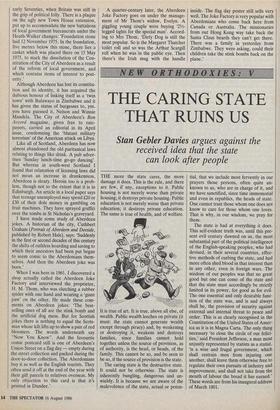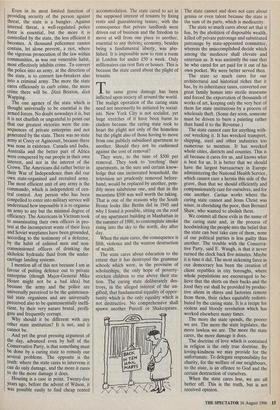NEW ORTHODOXIES: V
THE CARING STATE THAT RUINS US
Stan Gebler Davies argues against the
received idea that the state can look after people
THE more the state cares, the more damage it does. This is the rule, and there are few, if any, exceptions to it. Public housing is not merely worse than private housing; it destroys private housing. Public education is not merely worse than private education; it destroys private education. The same is true of health, and of welfare.
It is true of art. It is true, above all else, of wealth. Public wealth leeches on private (it must: the state cannot generate wealth except through piracy) and, by weakening or destroying it, weakens and destroys families, since families cannot hold together unless the source of provision, as of authority, is the head, or heads, of the family. This cannot be so, and be seen to be so, if the source of provision is the state.
The caring state is the destructive state. It could not be otherwise. The state is inherently bungling, dangerous and un- wieldy. It is because we are aware of the malevolence of the state, actual or poten- tial, that we include most fervently in our prayers those persons, often quite un- known to us, who are in charge of it, and we have sanctified, since time immemorial and even in republics, the heads of state. One cannot trust those whom one does not know to care for those whom one loves. That is why, in our wisdom, we pray for them.
The state is bad at everything it does. This self-evident truth was, until this pre- sent evil century dawned on us, the most substantial part of the political intelligence of the English-speaking peoples, who had devised, in their several countries, effec- tive methods of curbing the state, and had more often shed blood in that interest than in any other, even in foreign wars. The wisdom of our peoples was that no great good but one can come of the state and that the state must accordingly be strictly limited in its power, for good as for evil. The one essential and only desirable func- tion of the state was, and is and always shall be, the provision of security against external and internal threat to peace and order. This is as clearly recognised in the Constitution of the United States of Amer- ica as it is in Magna Carta. The only thing necessary 'to close the circle of our felici- ties,' said President Jefferson, a man most unjustly represented by statists as a statist, Is a wise and frugal government, which shall restrain men from injuring one another, shall leave them otherwise free to regulate their own pursuits of industry and improvement, and shall not take from the mouth of labour the bread it has earned.' These words are from his inaugural address of March 1801. Even in its most limited function of providing security of the person against threat, the state is a bungler. Against internal threat, a well-regulated police force is essential, but the more it is controlled by the state, the less efficient it becomes. A thousand policemen cannot contain, let alone prevent, a riot, where the vigorous prosecution of the law within communities, as was our venerable habit, most effectively inhibits crime. To convert the police into an army, at the direction of the state, is to convert law-breakers also into a criminal army. The more the state cares officiously to curb crime, the more crime there will be. Dixit Brixton, dixit Wapping.
The one agency of the state which is thought universally to be essential is the armed forces. No doubt nowadays it is, but it is not churlish or ungrateful to point out that our greatest victories were the con- sequences of private enterprise and not generated by the state. There was no state army at Crecy or Agincourt, because there was none in existence. Canada and India, Australia and the better part of Africa were conquered by our people in their own interest, and not in the interest of the Crown. The Americans did rather better in their War of Independence than did our own state-organised and recruited army. The most efficient unit of any army is the commando, which is independent of cen- tral control. Any person who has been compelled to enter into military service will understand how impossible it is to organise an army to any but the minimal degree of efficiency. The Americans in Vietnam took to assassinating their own officers in pro- test at the incompetent waste of their lives and Soviet warplanes have been grounded, according to the testimony of a defector, by the habit of enlisted men and non- commissioned officers of drinking the alcholoic hydraulic fluid from the under- carriage landing systems.
I mention all of this not because I am in favour of putting defence out to private enterprise (though Major-General Mike Hoare might not be a bad idea) but because the army and the police are universally perceived to be the quintessen- tial state organisms and are universally perceived also to be quintessentially ineffi- cient, by their very nature brutal, profli- gate and frequently corrupt.
Why should it be different with any other state institution? It is not, and it cannot be.
And yet the great pressing argument of the day, advanced even by half of the Conservative Party, is that something must be done by a caring state to remedy our several problems. The opposite is the truth: where the state cares to intervene it can do only damage, and the more it cares to do the more damage it does.
Housing is a case in point. Twenty-five years ago, before the advent of Wilson, it was possible easily to find cheap rented accommodation. The state cared to act in the supposed interest of tenants by fixing rents and guaranteeing tenure, with the consequence that private landlords were driven out of business and the freedom to move at will from one place to another, essential to any thriving economy, besides being a fundamental liberty, was abo- lished. It is impossible now to rent a room in London for under £50 a week. Only millionaires can rent flats or houses. This is because the state cared about the plight of tenants.
The same grave damage has been inflicted upon society all around the world. The malign operation of the caring state need not necessarily be initiated by social- ists. New York City is not socialist, yet huge stretches of it have been burnt to cinders because the caring state took to heart the plight not only of the homeless but the plight also of those having to move from one publicly subsidised apartment to another. Should they not be cushioned against the cost of removal? They were, to the tune of $500 per removal. They took to 'torching' their apartments, in the sure and certain know- ledge that one incinerated household, the television set prudently removed before- hand, would be replaced by another, poss- ibly more salubrious one, and that in the meantime $500 was well worth the taking. That is one of the reasons why the South Bronx looks like Berlin did in 1945 and why I found it possible, sitting on the roof of my apartment building in Manhattan in the summer of 1980, to contemplate smoke rising into the sky to the north, day after day. When the state cares, the consequence is filth, violence and the wanton destruction of wealth.
The state cares about education to the extent that it has destroyed the grammar schools which were, in the provision of scholarships, the only hope of poverty- stricken children to rise above their sta- tion. The caring state deliberately des- troys, in the alleged interest of the un- gifted, that fundamental equality of oppor- tunity which is the only equality which is not destructive. No comprehensive shall spawn another Purcell or Shakespeare. The state cannot and does not care about genius or even talent because the state is the sum of its parts, which is mediocrity.
The state so much cares about art that it has, by the abolition of disposable wealth, killed off private patronage and substituted patronage by state-appointed committee, wherein the unaccomplished decide which among the mediocre shall elevate and entertain us. It was anciently the case that he who cared for art paid for it out of his own pocket. We were better served then.
The state so much cares for our architectural and historical riches that it has, by its inheritance taxes, converted our great family homes into sterile museums and forced the exportation of thousands of works of art, keeping only the very best of them for state institutions by a process of wholesale theft. (Some day soon, someone must be driven to burn a painting rather than hand it to the Revenue.) The state cannot care for anything with- out wrecking it. It has wrecked transport, shipping, steel and other industries too numerous to mention. It has wrecked whole cities, districts and counties. This is all because it cares for us, and knows what is best for us. It is better that we should have the largest bureaucracy in Europe administering the National Health Service, which cannot cure a hernia this side of the grave, than that we should efficiently and compassionately care for ourselves, and for one another. Caritas works where the caring state cannot and Jesus Christ was wiser, in cherishing the poor, than Bernard Shaw, who wanted to abolish them.
We commit all these evils in the name of the caring state and, in the process of hoodwinking the people into the belief that the state can best take care of them, none of our political parties is less guilty than another. The trouble with the Conserva- tive Party, said E. Waugh, is that it never turned the clock back five minutes. Maybe it is time it did. The most sickening farce in our democracy has been the creation of client republics in city boroughs, where whole populations are encouraged to be- lieve that the shirts on their backs and the food they eat shall be provided by produc- tive aliens in shires and factories remote from them, their riches equitably redistri- buted by the caring state. It is a recipe for violent and bloody revolution which has worked elsewhere many times.
The more the state spends, the poorer we are. The more the state legislates, the more lawless we are. The more the state cares, the more damage it does.
The doctrine of love which is contained in religion is the only true doctrine. By loving-kindness we may provide for the unfortunate. To delegate responsibility for charity, for the welfare of our neighbours, to the state, is an offence to God and the certain destruction of ourselves.
When the state cares less, we are all better off. This is the truth, but is not received opinion.











































 Previous page
Previous page